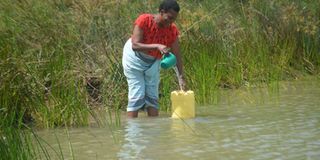The long, dangerous walk to Ganze water pans

What you need to know:
- Lack of water in parts of Ganze Constituency a major factor to rampant cases of sexual and gender-based violence.
- Women and girls are forced to trek for more than 15km in search of water.
- Mothers forced to leave their children at home when going to fetch water exposing them to defilement by relatives.
- Because of poverty, the village women can't afford to pay boda boda riders to deliver water to their homes.
Lack of water in parts of Ganze Constituency has been cited as a major factor to rampant cases of sexual and gender-based violence.
Worst hit is Sokoke Ward where women and girls are forced to trek for more than 15km in search of water.
Last Wednesday, local women leaders urged Kilifi County government to provide water points in the wards to protect women from exposure to perpetrators who lay in wait for them as they go to fetch water in the remote areas.
WIMA, an empowerment community-based organisation in Kilifi, said women live in fear of being subjected to sexual violence every day.
“Women and girls in our society are always tasked with fetching water for domestic use, this means they are at risk since they get exposed to insecure environment on their way to the water points where they are forced to walk for long distances,” said Laura Wawuda, a women’s rights activist who is also the WIMA secretary.
KILL WOMEN
“We are afraid we might start having incidents where perpetrators kill women and girls to conceal evidence.”
Mothers are sometimes forced to leave their children at home when going to fetch water and this has exposed and subjected them to defilement by relatives.
She said some of the women and girls have also been gang raped.
“The victims leave their homes to go fetch water but on reaching the dams, they find men idling around who later defile them, while others are sexually harassed,” added Wawuda.
“We need taps to ease the burden for our women and girls, “she said.
In April, an eight-year-old girl from Kanyumbuni village was defiled and murdered.
The body of Esther Sidi, a Class Three pupil at Bamba Primary School was found dumped at a water pan after she mysteriously disappeared after leaving home to go fetch water.
A resident of Kinung’una village, Ms Kazo Koi said she is forced to wake up at 4am every day to collect water before livestock arrive at the water pan and dirty the water.
UNTREATED WATER
The seven kilometre walk, she said, is scary because she has to pass through thickets to get to Ziaramia water pan, the nearest to her village.
“We always consume dirty, untreated water, which we share with the livestock and as a result, our children often suffer from diarrhoea,” she said.
Ms Koi noted that women and girls find it hard to maintain menstrual hygiene because water is scarce.
Most water pans and dams in Ganze rely on rainwater, which means there is severe scarcity during the dry season.
“We need to be clean, especially when one is experiencing her periods but most of us can only afford to shower once a day to save water for other domestic use,” she said.
She noted that lack of water has been a concern for years now, but despite their outcry, no one has come to address their plight.
Ms Bahati Barawa, a mother of five girls from Madamani village said her daughters team up with other girls from the neighbourhood to go fetch water due to high insecurity.
Because of poverty, the village women cannot afford to pay boda boda riders to deliver water to their homes, she says.
The boda bodas charge Sh200 a trip, which, to most villagers, is unaffordable.
“Most women are poor and that is why we are risk our lives to trek for hours to go fetch water. We are not safe at all,” said Ms Barawa.




